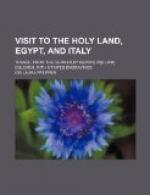As I already felt somewhat better, I attempted to rise, but was thrown in the same instant with such force against a table which stood opposite, that for a long time I felt no inclination to try again. There was not the slightest chance of obtaining any sleep all night. The dreadful howling of the wind among the masts and cordage, the fearful straining of the ship, which seemed as though its timbers were starting, the continual pitching and rolling, the rattling of the heavy cables above us, the cries, orders, and shouting of the captain and his sailors, all combined to form a din which did not allow us to enjoy a moment’s rest. In the morning, ill as I felt myself, I managed to gain the deck with the help of the steward, and sat down near the steersman to enjoy the aspect of that grandest of nature’s phenomena—a storm at sea.
Holding tightly on, I bade defiance to the waves, which broke over the ship and wetted me all over, as though to cool my feverish heat. I could now form a clear and vivid conception of a storm at sea. I saw the waves rush foaming on, and the ship now diving into an abyss, and anon rising with the speed of lightning to the peak of the highest wave. It was a thrilling, fearful sight;—absorbed in its contemplation, I soon ceased to think of my sickness.
Late at night the violence of the storm abated in some degree; we could now run in and cast anchor in the harbour of Varna, which under ordinary circumstances we should have reached twelve hours sooner.
April 5th.
This morning I had leisure to admire this fine fortress-town, which was besieged and taken by the Russians in 1828. We remained here several hours. The upper portion of the ship was here loaded with fowl of all descriptions, to such a degree that the space left for us travellers was exceedingly circumscribed. This article of consumption seems to be in great demand in Constantinople both among Turks and Franks; for our captain assured me that his vessel was laden with this kind of ware every time he quitted Varna, and that he carried it to Stamboul.
April 6th.
The shades of night prevented my seeing one of the finest sights in the world, in anticipation of which I had rejoiced ever since my departure from Vienna—the passage through the Bosphorus. A few days afterwards, however, I made the excursion in a kaik (a very small and light boat), and enjoyed to my heart’s content views and scenes which it is totally beyond my descriptive power to portray.
At three o’clock in the morning, when we entered the harbour of Constantinople, every one, with the exception of the sailors, lay wrapped in sleep. I stood watching on deck, and saw the sun rise in its full glory over the imperial city, so justly and universally admired.
We had cast anchor in the neighbourhood of Topona; the city of cities lay spread out before my eyes, built on several hills, each bearing a separate town, and all blending into a grand and harmonious whole.




